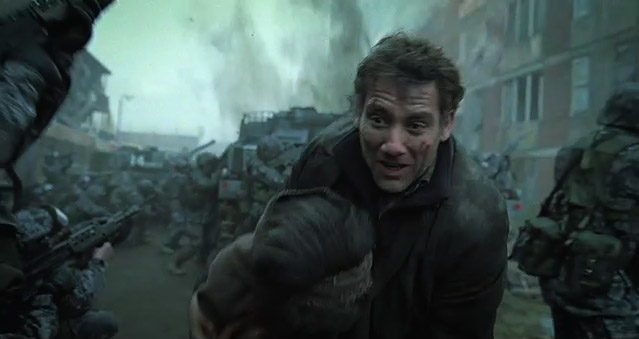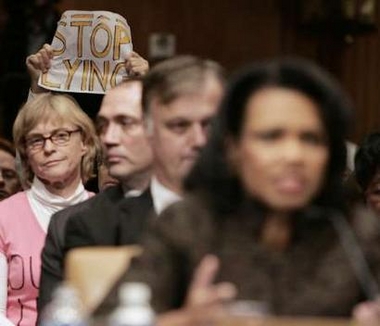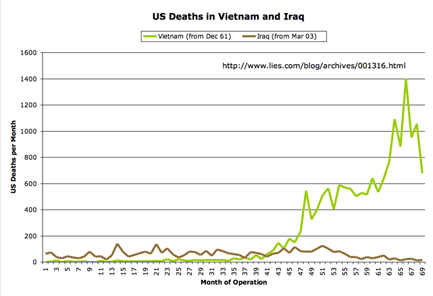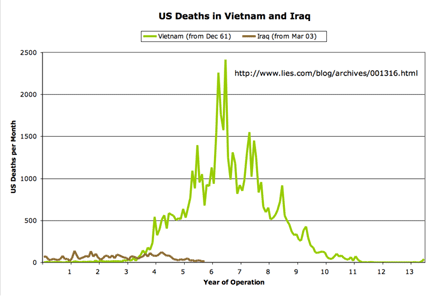Sorry for the long absence.
Last night I listened to Bush explain how “we” believe sending more troops is the solution for Iraq. Funny how the Decider-in-Chief backs away from “I” and “me” as the consequences of his decisions become harder to deny.
I’m not going to go point-by-point through the idiocy. I don’t think it’s necessary. No one is fooled any more. But I did want to mention a few of the things I’ve been thinking about lately.
One is the quote that Jonathon Schwarz pointed out a few weeks ago:
Q What can you say tonight, sir, to the sons and the daughters of the Americans who served in Vietnam to assure them that you will not lead this country down a similar path in Iraq?
THE PRESIDENT: That’s a great question. Our mission is clear in Iraq. Should we have to go in, our mission is very clear: disarmament… it’s very clear what we intend to do. And our mission won’t change. Our mission is precisely what I just stated.
That was Bush back on March 6, 2003, a few days before the invasion.
The latest escalation is simply, as Josh Marshall has been pointing out, a way for Bush to “kick the can” down the road. He’s spending lives and dollars for his own vanity. It’s a way for him to avoid embarrassment, to continue pretending his emperor’s clothes look good after everyone realizes he’s naked.
The boy in the crowd who was brave enough to be the first to speak out is John Murtha. Every time that guy opens his mouth these days it’s shocking how much honesty comes out. He reminds me of Howard Beal in Network after his breakdown.
My new page-a-day Onion desk calendar (thanks, Mary!) had this item the other day:
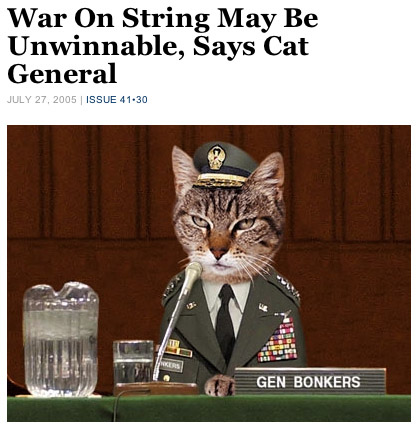
It’s not really a funny subject, I realize, but sometimes you just have to laugh.
But the reality is pretty grim. We will be paying a collective price for this for many, many years. Lately I’ve been listening to a lot of Chris Whitley, especially his War Crime Blues, and as I listen to songs like Invisible Day, which he recorded under the Albert Bridge in Dresden, I listen to the sound of the swallows, and the water flowing past, and I wonder what he was feeling that day. It was the spring before his last healthy summer, his forty-fourth summer, and he sang with an earnestness that leaves me aching for all that we’ve lost these last few years.
Invisible Day (mp3 file)
Where do we go from here?
Where do we go from here?
All my defenses dissolve in the air
Where do we go from here?
Michael come take this blade
Michael come take this blade
Steel for the plow to bury the dead
Saint Michael take this blade
The children witness
And the ghosts can see
The still invisible day
Of victory
How will the harvest ride?
How do the fallen rise?
Up in the air, behind your eyes
Oh, how the harvest will rise
The children witness
And in ghosts can see
The still invisible day
Of victory
Roll away the stone
Rollin’ away the stone
Rise to shine
From the buildings of bone
Children witness
What the ghosts can see
The still invisible day
Of victory
Some kind of light in the sky
Some kind of light in the sky
Some kind of guidance
To get us by
— Chris Whitley, 1960 – 2005
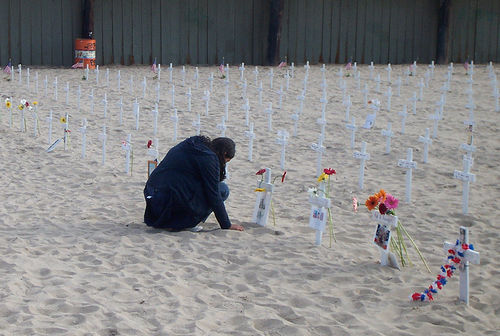
(Flickr photo by mamamusings)
